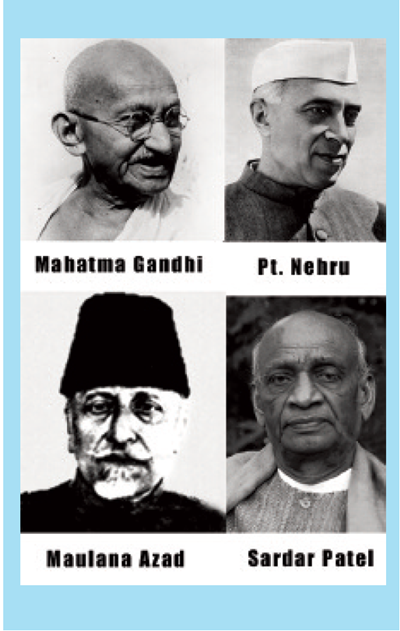
Page-1|Page-2
|
Page-3
|Page-4|Page-5|Page-6
|Page-8
|Page-9
|
Page-10
|
BaKhabar  Download pdf Download pdf
|
|
Narendra Modi: Stumbling on history
.... By Amulya Ganguli, for mathrubhumi.com
It is difficult to anticipate what may cause a politician to stumble. When Narendra Modi was chosen by the Bharatiya Janata Party (BJP) as its prime ministerial candidate, his only disadvantage was his anti-minority image. It isn't surprising, therefore, that he has been working overtime to refurbish his reputation in this respect - short of wearing a skull cap.  It is not known whether he has succeeded. But, in the meantime, he has been ambushed by a trait which cannot be easily rectified for it is a part of his personality and background. The characteristic is his inattention to historical details. Whether born of carelessness in the drafting of his speeches, or the outcome of his school record as an "average" student, as one of his teachers in Vadnagar testified, the flaw can divert attention from his message. However impressive his oration may be, even one "slip of the tongue", as an acolyte has explained, can spoil the overall effect. But the problem for the BJP, as is evident from the eagerness with which his supporters in the media and elsewhere are coming to his defence, is that his mistakes are piling up. Modi's first blunder was understandable. The erroneous claim that Nehru did not attend Sardar Patel's funeral was palpably motivated by his zeal to paint the first prime minister in darker hues than what history portrays, presumably because, according to Modi, he had usurped the Iron Man's rightful place in that office. But this was not the only occasion when Modi played fast and loose with history. His mixing up of two towering personalities of ancient India - Chandragupta Maurya and Chandragupta II of the Gupta dynasty - showed that he was out of his depth where knowledge of the past was concerned. This deficiency was substantiated by his assertion that Alexander was stopped by the Ganga. Considering that every schoolboy knows that the Macedonian conqueror met his match in Porus in Punjab, which is far away from the Ganga, the faux pas was inexcusable. As was the placing of two centres of learning a thousand miles apart - Taxila in the northwest of the sub-continent and Nalanda in Bihar - in close proximity to one another. But perhaps Modi's most disturbing howler was telling a public meeting that Shyama Prasad Mukherjee died abroad when he meant Shyamji Krishna Varma, a Gujarati freedom fighter who is not very well known outside the state. The memory lapse was curious since Modi had gone abroad in 2003 to bring back Varma's ashes and dedicated a memorial to him in 2010. Although he later apologized for his mistake, the mental confusion over the two names is odd since there is nothing common between them except the word "Shyam". Besides, as the founder of the Jana Sangh (the BJP's predecessor), Mukherjee had a major presence in saffron history and his name cannot easily be substituted with someone else's, especially by a person who began his political life at an early age as a pracharak (preacher) of the Rashtriya Swayamsevak Sangh (RSS). As a Congress spokesman pointed out, it is like confusing between Jawaharlal Nehru and Arun Nehru. That the BJP is worried by these blunders is evident from the decision to deploy what has been described as "in-house historians" to vet the draft of Modi's speech before his next major public engagement in Bengaluru. The party is obviously concerned that having built up Modi as a larger-than-life figure, it doesn't want to expose his feet of clay. Its worries are probably all the greater because having tried to portray Rahul Gandhi as "Pappu", or an immature youth, mainly through the saffron elements in the cyber world, a smearing of Modi's image because of his inadequate acquaintance with history can be politically damaging since it will undermine the he-man's image among the intelligentsia. As it is, the Hindutva lobby's version of history is quite different from what is commonly accepted in the academic world - even if the saffronites dismiss it as a secular distortion. However, an understanding of how the saffron brigade sees the main trends of Indian history can be gauged from the following passage circulating in the Internet. It says: "what a pathetic country we are.. just ready to get screwed first by moghuls.. then brits.. then both.. then now another foreigner who has no interest in the country and then another half foreigner...come on folks...wake up..." This inanity is not very different from Modi's gaffes or Murli Manohar Joshi's attempt to rewrite history, when he was the human resource development minister, by describing the Indus Valley Civilization (3300 to 1300 B.C.) as Vedic to assert that India is the homeland of Aryans, unlike the claim in the "secular" version that they came from Iran in 1500 B.C. But there is a slight difference. The execrable taste displayed by the netizen can be said to have been replicated by Modi when he said - rather tastelessly - that in view of Sonia Gandhi's "illness" (she is reported to have had cancer), she should make way for the shehzada (prince), or Rahul. Not only should Modi take lessons in history but also in good manners. (Amulya Ganguli is a political analyst. The views expressed are personal. He can be reached at amulyaganguli@gmail.com). Source: Ummid.com |
Abusive Attacks on Founding Fathers of Nation are Disgraceful
.... By Prof. V.K. Tripathi, IIT Delhi
 Ever since RSS/ BJP have nominated Narendra Modi their prime ministerial candidate, media is giving him round the clock coverage. The educated and affluent elite are enthralled. In riot torn Western UP, as also in other parts of the country, he is the hero of riot-mongering aggressive elements. It has emboldened him and his supporters to vociferously attack the founding fathers of the nation, particularly Gandhi and Nehru, the icons of freedom and secularism. By quoting historical facts wrong, Modi not only displays ignorance about history but reveals scant understanding of historical perspective and historical forces. How could he blame Gandhi, Nehru or Congress for partition? Can he not recognize the forces who unleashed the reign of terror and bloodbath, created conditions of civil war and connived with the colonial power – the Muslim League, RSS, Hindu Mahasabha, the Rajas and Nawabs, and the classes who supported them? Gandhi was the architect of satyagraha (the doctrine of nonviolent struggle) and originator and leader of mass movement for freedom. Masses all over the country, in all regions, all religions, all languages, all castes, and all communities, barring a sectarian fringe, accorded him highest love and respect, followed his dictates for political action against the mighty colonial power, and treated him like their father. Subhash Chandra Bose only echoed mass sentiment when he called him father of the nation. Rabindra Nath Tagore called him the Mahatma. Gandhi stood against communal storm with unprecedented sensitivity and courage and faced assassin’s bullets. UN Assembly rightly called him the greatest Indian after Buddha. It is insulting to say Gandhi handpicked Nehru over Patel for prime minister ship against the wishes of the congressmen or masses. Nineteen forty onwards, when Maulana Abul Kalam Azad was the Congress President, Patel was the man of party organization; hence heads of several Congress Committees were either appointed by him or had closer links with him. But that was the period when party elections were hardly held as Congress was engaged in the do or die phase of freedom struggle. There is no evidence of power struggle between Nehru and Patel, no evidence of Nehru commanding less support of Congressmen or less popularity among the masses. In 1949, in a letter Patel himself acknowledged Nehru as the hero of the masses. Indeed they had different dimensions of personality but these were complementary to each other. Nehru had a vision of economic policy, foreign policy and science-technology policy, in part at variance with that of Gandhi, but Patel or other Congress leaders did not oppose it. From peoples’ perspective, there is always scope for criticism of policy and implementation strategy, but basing it on personality is mischievous. It can only revive sectarian passions and render people vulnerable to more severe exploitation. Email ID of Prof. Vipin Tripathi <tripathivipin@yahoo.co.in>  |
|
7
Home
| About
Us | Objective | Scholarship
| Matrimonial
| Video
Library | Projects | Quran
Resources | Lend
a hand
|